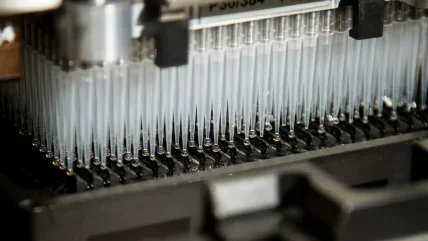
The suburb of Speke is 7.7 miles from Liverpool’s bustling city centre. Unlike neighbouring Everton or Toxteth, it has failed to grow, and is known as the home of John Lennon Airport, flat expanses of post-industrial land and a grand Tudor manor house. Even more importantly, it houses one of the UK’s two specialist vaccine factories.
Some 600 people are employed in the Seqirusowned plant, which provides around half of the UK’s vaccines, and is its main supplier of injectable vaccines for infectious viruses such as influenza. Around 50 million doses of flu vaccine are produced in this facility – which will play an integral part in the UK’s mission to fight Covid-19 if a vaccine is discovered – before being shipped to places as far afield as Australia and New Zealand.
Flu vaccines are predominantly made with chicken eggs. Strains are then injected into any one of the six million fertilised eggs that line the factory shelves and incubated so that the virus multiplies. After three days the egg white protein mixture containing virus particles is extracted and chemically inactivated to render it harmless. The vaccine is a dilute solution of this mixture, with additional preservatives added in.
While alternative manufacturing methods using cell cultures are being developed, for now at least, the UK’s ability to create vaccines to fight influenza depends on a well-oiled supply chain that shifts millions of eggs from rural farms to Speke. Bad weather or delays in egg production could cause costly losses for Seqirus and potentially jeopardise the country’s vaccine supply.
Home to roost
On an elementary level, Speke’s relentless demand for hens’ eggs illustrates some of the delicate issues pharmaceutical supply chains around the world must manage to ensure there are ample supplies of investigational drug production materials delivered to manufacturers. In these complex interweaving systems, the success of a trial is highly dependent on a moving chain of composite parts. Because of the disruptions caused by Covid-19, pharmaceutical companies and couriers are having to work night and day to set up workarounds that ensure supplies of potentially life-saving vaccines and treatments get to clinical sites, regardless of transport limits.
Ana-Zeralda Canals, senior clinical trial supplies manager at Debiopharm, has trained herself to expect disruptions like these. For Canals, while managing an efficient clinical supply chain is not about being unduly pessimistic, being sceptical is a big part of the job.
“You have to imagine the worst possible problems that you might have, because half of those might happen,” Canals says. “So never take anything for granted – [like the fact] that all the shipments will be performed at the right temperature, for instance, just because the courier says, ‘it’s going to be okay’.”
At Debiopharm, Canals is responsible for piecing this fast-moving jigsaw together. To start, she’s responsible for ensuring drugs are available in the requisite quantities and preparing the labels for their packages. Some of these functions are conducted in-house, while others need to be coordinated with contract manufacturing companies.
Then there’s the small matter of ensuring that drugs have passed regulatory approval and been delivered on time, plus the vital role of managing the in-house interactive response technology (IRT) system to assign treatment arms, update relevant patient information and ensure identities are blinded. With timelines tight and growing tighter, Canals has to mediate between various cogs in the supply chain, estimating when certain drugs will arrive and risk-managing the consequences if they don’t.
“A trial can be three years long, so [you need to ensure] that the drug is on time because you’re not working with one company, you’re working with your chemistry, manufacturing and control department, and they’re working with somebody else who’s preparing your product,” Canals says. “[Ultimately], they have their timelines and you have yours.”
A Swiss company dedicated to developing, manufacturing and investing in innovative therapies that “respond to high unmet medical needs”, Debiopharm has yielded some exciting innovations of late, particularly in the fields of oncology and bacterial infections.
In March, the company announced that it had launched a dose escalation phase-I clinical trial, assessing the safety and efficacy of compound Debio 0123 combined with carboplatin to treat refractory solid tumours.
Alongside clinical studies, Debiopharm has also been utilising new technologies to speed up and predict clinical outcomes; collaborating with pharma group Novadiscovery to predict a new drug’s clinical benefit via in silico computer simulation software.
For Canals, this approach is broadly indicative of where the clinical landscape might be heading, as technology becomes more embedded into how trials are conducted, and as more therapies are administered remotely. In particular, real-time data-monitoring strategies incorporated into IRT are revolutionising the clinical supply chain, enabling pharma teams to be more agile and monitor potential risks, calculating stock changes and the likelihood of trial success.
“Some CROs [clinical research organisations] find it very hard to move to more of a real-time platform, but they’re evolving and becoming more tech-savvy,” Canals says. “Especially because they’re starting to join forces with IT companies. Very soon, we won’t need people flying over and being there face-to-face [for clinical trials] because we can do all this online.”
Of course, as Canals maintains, remote working is no excuse for a lack of professional clarity. It can only succeed through a commitment to placing a greater onus on transparency within all facets of the supply chain.
“Be open to the [vendor] and show them your expectations and timelines,” she recommends. “Don’t be scared to explain to them and get them involved in those tight timelines, and ask them for help. They will always find the best available option. It’s about being transparent and having them be a part of the team.”
When it comes to patient enrolment technology has been something of a double-edged sword. Though it gives pharmaceutical companies more access to patients than ever before, the plethora of medical data available has created new recruitment challenges as well as opportunities.
“It’s easier to select your sites and the countries involved for that clinical trial,” Canals explains, “but on the other hand, because there are more trials going on, recruitment can be harder because patients have been located for rival trials. If it’s a rare disease, for example, and there are several clinical trials happening in one place, the chances of recruiting patients are normally lower.”
Unpredictable delays like that can make themselves felt in the supply chain. Clearly, the same technological advances that allow for more adaptable trials and more targeted populations put extra strain on logisticians to shape supply to meet the needs at hand. In the past, sourcing the drugs and materials required for trials took many months, but those packages are now expected to arrive in half the time, meaning Canals and her peers effectively have to work twice as fast.
Debiopharm may not be engaged in making a Covid vaccine, but it is endeavouring to help with other facets of detection and disease management. The company has established a ‘Coronavirus task force’ to provide medical staff and patients with the necessary technology and products to prevent and treat the virus. In March, the company helped to distribute a diagnostic test on the Biocartis platform, designed to monitor the body’s immunity responses to infectious disease.
Charting the fall of Covid-19
Despite not being personally involved with clinical trials research for Covid, Canals – a former student of Oxford and Imperial College London – is encouraged by the work being done to develop a vaccine at both universities.
The institutions have moved at the clinical equivalent of light speed, with Oxford and AstraZeneca launching phase-II and III trials only a month after starting phase I. Imperial, meanwhile, is experimenting with RNA technology, which uses synthetic strands of genetic code rather than small quantities of the virus itself. A cutting-edge approach to an endlessly complex endeavour, RNA could revolutionise vaccine development and enable scientists to respond more quickly to emerging global diseases in the future.
“I’m really hopeful; I think we’re moving along really well, and people are really moving ahead with the situation,” says Canals, who sees the rapid response to the pandemic as a positive exhibition of just how agile the pharma industry can be – not least the work done by the US FDA and European health authorities “agreeing on fast approval so that the clinical trials could start as soon as possible”.
Though she has since developed a professional scepticism, it was a desire to harness new technologies and treatments that motivated Canals to become more involved in the clinical trials in the first place. After leaving Oxford she began working for EGGP & AESP in Mallorca, a firm specialising in the development of genetic preventative medicine.
“Most diseases will not be cured, but you can help people cope with those,” Canals says pragmatically. “I suppose that, coming from the genetics side of things, I approached it that way, rather than wanting to be involved in creating the next blockbuster drug.”
That said, when that breakthrough moment does happen, Canals admits that the results can be extremely rewarding, referring specifically to a phase-II trial performed during her time at Sanofit for a drug to cure the rare and enigmatic skin cell disease of calciphylaxis.
“We didn’t have a central CRO, and it took a bit longer to recruit the patients that we wanted, but the results showed that the drug really worked and the results have been published,” Canals says. “There were lots of ups and downs, but it was very fulfilling.”
In a role where success or failure is largely dependent on things outside of your control, Canals’ salient advice to professionals working in clinical supply and logistics is to expect the unexpected.
“Always have an escape route,” she stresses. “Even if you’re going to be doing it this way, it’s always very important to have a plan B, just in case something goes wrong. Especially now with Covid. It might be that there’s a miscommunication between the clinical operations team and the supply chain team, but you have to think ‘what if my drug cannot be supplied or cannot be taken?’”
As pharmaceutical companies around the world work tirelessly to create life-saving vaccines for Covid- 19, a robust supply chain will be needed to help ensure that clinical trials run smoothly and safely.
Inside and outside of Speke, pharma companies need to ensure that they plan for every eventuality and do not place all their eggs in one basket. From there, it’s all about having the dogged, determined attitude to overcome the myriad challenges of getting them where they need to go.





